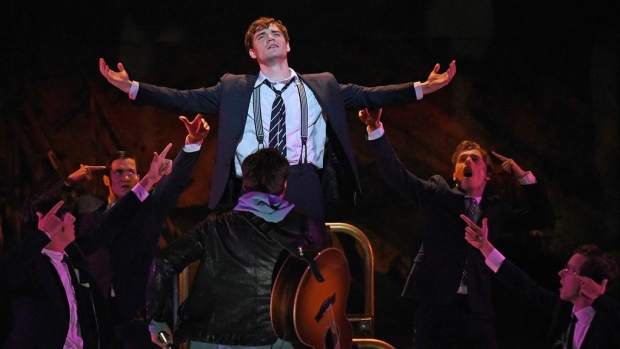Spring Awakening

(© Kevin Parry)
Last year's production of Spring Awakening, downtown at Inner-City Arts, won several awards, including a Los Angeles Drama Critics award for Spencer Liff's choreography. Now the production has moved to the elegant Wallis Annenberg Center for the Performing Arts and is as stirring and inventive the second time. The 2006 musical, based on the Frank Wedekind play, demonstrates that the kids are not all right and that the parents are to blame. The bourgeoisie eat their young and take no responsibility for their failures. The youngsters explore their burgeoning sexuality with no knowledge of consequences, even though they seek advice from their elders. Their teachers and parents are either too ignorant, afraid, or envious to be beneficial.
In a German town at the end of the 19th century, a set of adolescents escape the drudgery of their daily life by exploring sex. Though society has become less puritanical, the town adults still view sex as prurient and the curious children as corrupt. Melchior (Austin McKenzie) has the greatest grasp of sex and has shared his notebook filled with drawings with his best friend Moritz (Daniel N. Durant, voiced by Alex Boniello). He also falls in love with Wendla (Sandra Mae Frank, voiced by Katie Boeck), a young girl bewildered but hungry to explore her sexuality.
Michael Arden, who starred in past Deaf West shows like Pippin and Big River, has masterfully directed this production. As in other productions, half of the cast are hearing and half are deaf. Everyone signs and each deaf actor has a speaking/singing colleague. Arden's genius turns sign not only into choreography, but into an expression of rage. Arden does not treat the deaf actor as interchangeable substitutes for the hearing. Their deafness becomes part of the characters. The language professor belittles outcast Moritz for how he pronounces Latin. Wendla corrects her mother's signing. Her mother bangs on the chair to get her attention. In this universe, Wendla and Moritz and several other characters are deaf.
The actors are exquisite. Frank portrays both Wendla's innocence and hunger for discovery while Boeck's singing voice is tragically beautiful. Durant erupts with fury as his character loses any sense of a future. Andy Mientus, who played Hans at the Ahmanson in 2008, captures the Peck's bad boy, seducing his friend Ernst and lusting after all the boys. Krysta Rodriguez, who understudied her role Ilse in the original Broadway cast, shocks the audience by stripping off her wig to reveal Ilse's bald head. Though Rodriguez herself has been conquering cancer through chemotherapy in recent months, removing the wig in character is a perfect visualization of a girl thrown away by society, stricken with poverty and illness, but defiant nonetheless. Of the adults, Natacha Roi is given the most range as she portrays the cruel school administrator, Wendla's clueless mother and the voice of Melchior's kind mother. The weaker link is McKenzie as Melchior. He has a pretty singing voice and a sweet persona but is off-pitch often and lacks the presence required for this role.
Arden's use of the double actors adds nuances. The speaker/singer for Wendla comments on her behaviors, egging her on to confront her mother at times. The female signers assist Hans in his already naughty masturbation scene. Arden also chooses a controversial ending that powerfully represents an invisible pied piper leading all the children to heaven as the parent helplessly look on. Arden focuses the play's ending on the adults who are justly punished for neglecting and ruining their angelic, confused children. It's heartbreaking because some of the adults, particularly Wendla's and Melchior's mothers, adore their children, yet they should be indicted as well as the cruel adults for stifling the kid's natural curiosities because of their own discomfort.
The score by rock artist Duncan Sheik, with a book and lyric by Steven Sater, contrasts the 19th-century settings with irreverent punk-rock revival songs that run the gamut from lyrical and poignant to hilarious. The sound design, however, has some serious problems. The band overwhelms the singing to the point that many of the lyrics are unintelligible, likely because the sound levels are uneven as a result of the band being scattered around the stage.
The dazzling visual design includes stars characterized by both projection and actors wearing gloves with lights, and in one sexually charged scene, a tableau of actors wrapped around each other into the formation of a grand tree.
The text of Spring Awakening again proves to be a perfect fit for Deaf West Theatre. Director Michael Arden and his cast have shrewdly chosen a tale that subtextually reflects what it can feel like to be deaf in a hearing society. The children in the play and some in the deaf community can be silenced by those in power and treated as irrelevant. But in both circumstances, individuality is stamped out, thereby robbing the world of wise and spirited groups.











